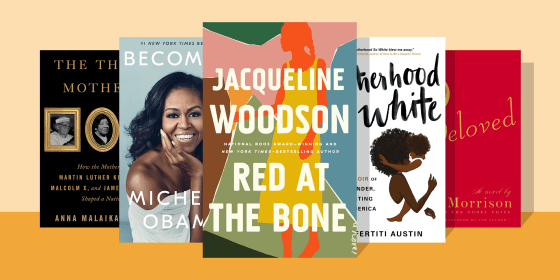Kala Herh
Kala Herh is a former digital editorial intern for Select on NBC News.

A New York Times Best Seller and 2019 Notable Book of the Year, Jacqueline Woodson’s book tells the story of teen motherhood. The story centers mostly around the protagonist’s coming of age ceremony in her grandparents’ Brooklyn brownstone. The book follows Melody as she begins to figure out who she is and what she wants to be, and flashes back to her mother Iris’s own inner conflict between independence and unexpected parenthood. Iris’s mother and mother-in-law’s own complexities figure prominently in this multi-generational story.
Brit Bennett’s debut novel tells the story of a young woman growing up without a mother and having to deal with her own pregnancy lacking this strong maternal presence. Set in Southern California, the New York Times Best Seller follows Nadia Turner, a rebellious seventeen-year-old whose mother commits suicide six months before the novel begins. To deal with the grief of her mother’s passing, Nadia strikes up a romance with the pastor’s son. The romance ultimately culminates in a pregnancy and subsequent cover up.
Like The Mothers, Clemmons informs readers about the contemporary issues affecting Black mothers in America when one loses their maternal figure. What We Lose chronicles a young woman as she deals with her mother’s passing to cancer, falls in love and the process of becoming a mother herself. The book was also named best Book of the Year by Vogue, BuzzFeed and Elle.
Toni Morrison’s Pulitzer Prize-winning novel is centered around the relationship between Sethe, and her unnamed daughter, who she had to kill to escape from slavery. Through Sethe’s relationship with her daughter and her own faint recollections of her own mother, the book shares how enslavement separated children from their mothers and prevented mothers from forming strong emotional attachments.
Naima Coster writes about one young woman’s attempt to repair the intimacies between her and her estranged mother, Mirella. When Penelope was a child, Mirella abandoned the family to reclaim her roots in the Dominican Republic. Their mother-daughter relationship is not perfect, but regardless of these differences in opinion, they both exhibit the deep maternal desire to re-cultivate a close relationship to one another.
Becoming is an intimate memoir by the former First Lady of the United States. Obama chronicles the experiences that have shaped her — everything from growing up on the South Side of Chicago to giving birth to her two daughters to her time in the White House. In 2018, Obama released a kid-friendly version of the book that features a new foreword and three photo inserts.
While Angelou has chronicled her life in other autobiographies, this book sheds light on one of her most intimate relationships, the one between her and her mother. Published shortly before Mother’s Day and Angelou’s 85th birthday in 2013, the book explains her mother’s abandonment of Angelou and Angelou’s older brother when they were younger and the process in which the pair rebuilt their relationship.
After receiving a letter from a new mother asking for guidance on how to raise a feminist, Chimamanda Ngozi Adichie penned this book. Providing fifteen pieces of advice, Adichie guides readers on the best ways to raise a young, independent woman. Adichie is best known for her bestselling book, We Should All Be Feminists, which encourages a more inclusive definition of feminism in the 21st-century.
Anna Malaika Tubbs documents the lives of three Black mothers whose passions and intellects shaped some of America’s most famous Civil Rights activists. The book “fights that erasure” of Alberta King, Louise Little and Berdis Baldwin, Tubbs previously told NBC. In addition to telling the stories of these women’s lives, Tubbs also incorporates the works of Black feminist theorists like Audre Lorde and Melissa Harris-Perry to analyze how women of the time resisted racism.
In this uplifting memoir, Nefertiti Austin shares her story of adopting a child as a single Black woman. Along the way she also examines the history of adoption in the African American community and the stereotypes single Black moms face.